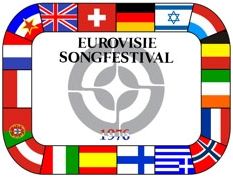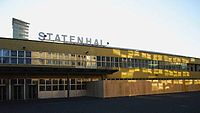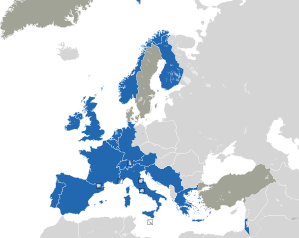The Eurovision Song Contest 1976 was the 21st edition of the annual Eurovision Song Contest. It took place in The Hague, Netherlands, following the country's victory at the 1975 contest with the song "Ding-a-dong" by Teach-In. Organised by the European Broadcasting Union (EBU) and host broadcaster Nederlandse Omroep Stichting (NOS), the contest was held at the Nederlands Congrescentrum on 3 April 1976 and was hosted by 1957 Dutch Eurovision winner Corry Brokken.
| Eurovision Song Contest 1976 | |
|---|---|
 | |
| Dates | |
| Final | 3 April 1976 |
| Host | |
| Venue | Nederlands Congresgebouw The Hague, Netherlands |
| Presenter(s) |
|
| Musical director | Jan Stulen |
| Directed by | Theo Ordeman |
| Executive supervisor | Clifford Brown |
| Executive producer | Fred Oster |
| Host broadcaster | Nederlandse Omroep Stichting (NOS) |
| Website | eurovision |
| Participants | |
| Number of entries | 18 |
| Debuting countries | None |
| Returning countries | |
| Non-returning countries | |
| |
| Vote | |
| Voting system | Each country awarded 12, 10, 8-1 points to their 10 favourite songs |
| Winning song | "Save Your Kisses for Me" |
Eighteen countries took part in the contest with Sweden, Malta and Turkey opting not to return to the contest after participating the previous year. Malta would not return to the contest again until 1991. On the other hand, Austria and Greece returned to the competition, having been absent since 1972 and 1974 respectively.
United Kingdom won the contest this year with the song "Save Your Kisses for Me" by Brotherhood of Man.[1] The song went on to become the biggest selling winning single in the history of the contest and won with 80.39% of the possible maximum score and an average of 9.65 of 12; a record under the voting system introduced in 1975.[2]
Location

The Hague is the seat of government of the Kingdom of the Netherlands and the capital city of the province of South Holland. It is also the third-largest city in the Netherlands, after Amsterdam and Rotterdam. Located in the west of the Netherlands, The Hague is in the centre of the Haaglanden conurbation and lies at the southwest corner of the larger Randstad conurbation. The contest took place at the Congresgebouw (presently known as the World Forum). The venue was constructed in 1969.
Participating countries
| Eurovision Song Contest 1976 – Participation summaries by country | |
|---|---|
Sweden, Malta and Turkey all decided not to participate this year, while Austria and Greece returned to the contest, making for eighteen participating countries.[1]
Sweden did not enter the contest as broadcaster Sveriges Radio (SR) did not have enough money to host another contest if Sweden should win again. A new rule was therefore introduced that in the future each participating broadcaster would have to pay a part of the cost of staging the contest. However, the introduction of a participation fee lead to Malta withdrawing from the Eurovision Song Contest 1976, despite already confirming participation and accepting submissions for their planned national final.[3][4] As the author and historian John Kennedy O'Connor notes in his book The Eurovision Song Contest – The Official History, there had been public demonstrations in Sweden against the contest, which also played a part in SR's decision not to take part.[5][6]
Returning artists
| Artist | Country | Previous year(s) |
|---|---|---|
| Fredi (Along with "The Friends") |  Finland Finland | 1967 |
| Anneli Koivisto (As part of "The Friends") |  Finland Finland | 1971 (as part of Koivistolaiset) |
| Peter, Sue and Marc |  Switzerland Switzerland | 1971 |
| Sandra Reemer |  Netherlands Netherlands | 1972 |
| Anne-Karine Strøm |  Norway Norway | 1973 (as part of Bendik Singers) 1974 (Along with Bendik Singers) |
Format
As with the Dutch hosted contest of 1970, each song was introduced by a pre-recorded film of the performing artist on location in their home nation. Unlike the 1970 films, the Dutch broadcaster made all of the films themselves, sending a crew to each nation to capture the footage. Both the artists from Monaco and Luxembourg were filmed in their respective nations, despite again not being from the country they were representing. Each film was preceded by an animated insert featuring the flags of the eighteen participating nations and ended with a profile shot of the artists.
The interval act was The Dutch Swing College Band led by Peter Schilperoort, who performed live on the stage, intercut with brief interviews with the artists from France, Israel, Austria, Belgium and Spain backstage in the green room conducted by Hans van Willigenburg. Willigenburg asked each of the five artists which song they thought would win, but only French singer Catherine Ferry was willing to give a definite answer; correctly predicting the United Kingdom.
The scoring system introduced in the previous year's competition returned in 1976. Each jury voted internally and awarded 12 points to the highest scoring song, 10 to the second highest, then 8 to the third, and then 7 to 1 (from fourth to tenth best song, according to the jury). Unlike today, the points were not given in order (from 1 up to 12), but in the order the songs were performed. The current procedure was not established until 1980 (also held in The Hague).
Contest overview
The following tables reflect the officially verified scores given by each jury, adjusted after the transmission. During the live broadcast, France failed to announce the 4 points they awarded to Yugoslavia, an error overlooked by the scrutineer, Clifford Brown. Thus in the live show, Norway were placed 17th and Yugoslavia 18th. After the broadcast, the scores were adjusted and the two nations swapped places, with Yugoslavia's score being adjusted from 6 to 10 points, moving Norway down to last place.
In terms of points gained as a percentage of maximum available, the winning UK entry from Brotherhood of Man is statistically the most successful winning Eurovision entry since the introduction of the 'douze points' scoring system inaugurated in 1975.[b]
| R/O | Country | Artist | Song | Points | Place |
|---|---|---|---|---|---|
| 1 |  United Kingdom United Kingdom | Brotherhood of Man | "Save Your Kisses for Me" | 164 | 1 |
| 2 |  Switzerland Switzerland | Peter, Sue and Marc | "Djambo Djambo" | 91 | 4 |
| 3 |  Germany Germany | Les Humphries Singers | "Sing, Sang, Song" | 12 | 15 |
| 4 |  Israel Israel | Chocolate, Menta, Mastik | "Emor Shalom" | 77 | 6 |
| 5 |  Luxembourg Luxembourg | Jürgen Marcus | "Chansons pour ceux qui s'aiment" | 17 | 14 |
| 6 |  Belgium Belgium | Pierre Rapsat | "Judy et Cie" | 68 | 8 |
| 7 |  Ireland Ireland | Red Hurley | "When" | 54 | 10 |
| 8 |  Netherlands Netherlands | Sandra Reemer | "The Party Is Over Now" | 56 | 9 |
| 9 |  Norway Norway | Anne-Karine Strøm | "Mata Hari" | 7 | 18 |
| 10 |  Greece Greece | Mariza Koch | "Panaghia mou, panaghia mou" | 20 | 13 |
| 11 |  Finland Finland | Fredi and the Friends | "Pump-Pump" | 44 | 11 |
| 12 |  Spain Spain | Braulio | "Sobran las palabras" | 11 | 16 |
| 13 |  Italy Italy | Romina and Al Bano | "We'll Live It All Again" | 69 | 7 |
| 14 |  Austria Austria | Waterloo and Robinson | "My Little World" | 80 | 5 |
| 15 |  Portugal Portugal | Carlos do Carmo | "Uma flor de verde pinho" | 24 | 12 |
| 16 |  Monaco Monaco | Mary Christy | "Toi, la musique et moi" | 93 | 3 |
| 17 |  France France | Catherine Ferry | "Un, deux, trois" | 147 | 2 |
| 18 |  Yugoslavia Yugoslavia | Ambasadori | "Ne mogu skriti svoju bol" | 10 | 17 |
Spokespersons
Each country nominated a spokesperson who was responsible for announcing the votes for their respective country via telephone. Known spokespersons at the 1976 contest are listed below.
 Spain – José María Íñigo[13]
Spain – José María Íñigo[13] United Kingdom – Ray Moore[8]
United Kingdom – Ray Moore[8]
Detailed voting results
Total score | United Kingdom | Switzerland | Germany | Israel | Luxembourg | Belgium | Ireland | Netherlands | Norway | Greece | Finland | Spain | Italy | Austria | Portugal | Monaco | France | Yugoslavia | ||
|---|---|---|---|---|---|---|---|---|---|---|---|---|---|---|---|---|---|---|---|---|
Contestants | United Kingdom | 164 | 12 | 8 | 12 | 8 | 12 | 3 | 10 | 12 | 12 | 10 | 12 | 4 | 10 | 12 | 10 | 7 | 10 | |
| Switzerland | 91 | 12 | 5 | 4 | 1 | 7 | 1 | 6 | 10 | 2 | 7 | 4 | 8 | 7 | 4 | 6 | 7 | |||
| Germany | 12 | 2 | 2 | 1 | 2 | 2 | 3 | |||||||||||||
| Israel | 77 | 6 | 7 | 3 | 7 | 5 | 4 | 2 | 7 | 8 | 1 | 10 | 6 | 2 | 1 | 8 | ||||
| Luxembourg | 17 | 6 | 6 | 5 | ||||||||||||||||
| Belgium | 68 | 7 | 6 | 1 | 4 | 6 | 12 | 8 | 3 | 8 | 8 | 5 | ||||||||
| Ireland | 54 | 10 | 1 | 3 | 3 | 8 | 5 | 12 | 2 | 6 | 3 | 1 | ||||||||
| Netherlands | 56 | 4 | 4 | 8 | 4 | 4 | 2 | 1 | 7 | 3 | 2 | 4 | 6 | 2 | 5 | |||||
| Norway | 7 | 3 | 4 | |||||||||||||||||
| Greece | 20 | 2 | 4 | 5 | 1 | 8 | ||||||||||||||
| Finland | 44 | 2 | 6 | 6 | 5 | 1 | 4 | 6 | 7 | 7 | ||||||||||
| Spain | 11 | 3 | 1 | 3 | 3 | 1 | ||||||||||||||
| Italy | 69 | 1 | 8 | 2 | 12 | 3 | 10 | 6 | 1 | 10 | 10 | 6 | ||||||||
| Austria | 80 | 4 | 3 | 10 | 10 | 5 | 3 | 10 | 7 | 2 | 6 | 5 | 8 | 5 | 2 | |||||
| Portugal | 24 | 6 | 4 | 1 | 1 | 12 | ||||||||||||||
| Monaco | 93 | 5 | 5 | 7 | 7 | 12 | 8 | 8 | 8 | 5 | 2 | 7 | 7 | 5 | 3 | 4 | ||||
| France | 147 | 8 | 10 | 12 | 5 | 10 | 10 | 7 | 12 | 8 | 5 | 3 | 10 | 6 | 12 | 5 | 12 | 12 | ||
| Yugoslavia | 10 | 1 | 2 | 3 | 4 | |||||||||||||||
12 points
Below is a summary of all 12 points in the final:
| N. | Contestant | Nation(s) giving 12 points |
|---|---|---|
| 7 |  United Kingdom United Kingdom |  Belgium, Belgium,  Greece, Greece,  Israel, Israel,  Norway, Norway,  Portugal, Portugal,  Spain, Spain,  Switzerland Switzerland |
| 5 |  France France |  Austria, Austria,  Germany, Germany,  Monaco, Monaco,  Netherlands, Netherlands,  Yugoslavia Yugoslavia |
| 1 |  Belgium Belgium |  Finland Finland |
 Italy Italy |  Ireland Ireland | |
 Ireland Ireland |  Italy Italy | |
 Monaco Monaco |  Luxembourg Luxembourg | |
 Portugal Portugal |  France France | |
 Switzerland Switzerland |  United Kingdom United Kingdom |
Broadcasts
Each participating broadcaster was required to relay the contest via its networks. Non-participating EBU member broadcasters were also able to relay the contest as "passive participants". Broadcasters were able to send commentators to provide coverage of the contest in their own native language and to relay information about the artists and songs to their television viewers.[1][16]
Known details on the broadcasts in each country, including the specific broadcasting stations and commentators are shown in the tables below. In addition to the participating countries, the contest was also reportedly broadcast in Algeria, Hong Kong, Iceland, Morocco, Tunisia and Turkey.[8]
| Country | Broadcaster | Channel(s) | Commentator(s) | Ref(s) |
|---|---|---|---|---|
 Austria Austria | ORF | FS2 | Ernst Grissemann | [17][18] |
 Belgium Belgium | RTB | RTB | [19] | |
| BRT | BRT | |||
 Finland Finland | YLE | TV1 | Heikki Seppälä | [20][21] |
| Rinnakkaisohjelma | Erkki Melakoski | |||
 France France | TF1 | Jean-Claude Massoulier | [22] | |
 Germany Germany | ARD | Deutsches Fernsehen | Werner Veigel | [23][24] |
 Ireland Ireland | RTÉ | RTÉ | Mike Murphy | [25][26] |
| RTÉ Radio | [27] | |||
 Israel Israel | IBA | Israeli Television | [28] | |
 Italy Italy | RAI | Rete Uno | Silvio Noto | [29] |
 Luxembourg Luxembourg | CLT | RTL Télé-Luxembourg | [30] | |
 Netherlands Netherlands | NOS | Nederland 2 | Willem Duys | [31] |
| Hilversum 3 | ||||
 Norway Norway | NRK | NRK Fjernsynet | Jo Vestly | [32] |
| NRK | Erik Heyerdahl | |||
 Portugal Portugal | RTP | I Programa | [33] | |
 Spain Spain | TVE | TVE 1 | José Luis Uribarri | [34] |
 Switzerland Switzerland | SRG SSR | TV DRS | Theodor Haller | [23] |
| TSR | Georges Hardy | [22] | ||
| TSI | [35] | |||
| RSI 1 | [36] | |||
 United Kingdom United Kingdom | BBC | BBC1 | Michael Aspel | [37] |
| BBC Radio 1, BBC Radio 2 | Terry Wogan | [38][39] | ||
| BFBS | BFBS Radio | Andrew Pastouna | [8] | |
 Yugoslavia Yugoslavia | JRT | TV Beograd 1 | [40] | |
| TV Koper-Capodistria | [29] | |||
| TV Ljubljana 1 | [41] | |||
| TV Zagreb 1 | [42] | |||
| Country | Broadcaster | Channel(s) | Commentator(s) | Ref(s) |
|---|---|---|---|---|
 Denmark Denmark | DR | DR TV | Per Møller Hansen | [43] |
 Iceland Iceland | RÚV | Sjónvarpið[c] | Jón Skaptason | [44] |
 Jordan Jordan | JTV | JTV2[d] | [45] | |
 Sweden Sweden | SR | SR P3 | Ursula Richter | [6][32] |
 Turkey Turkey | TRT | TRT Televizyon | [46] |
See also
Notes
References
External links



